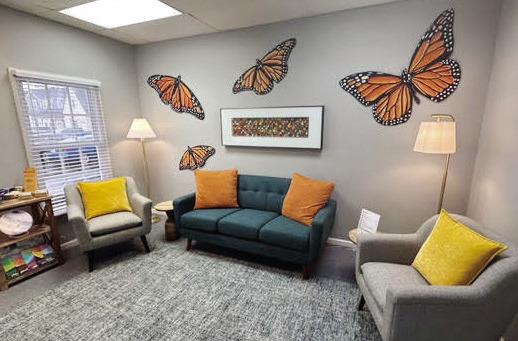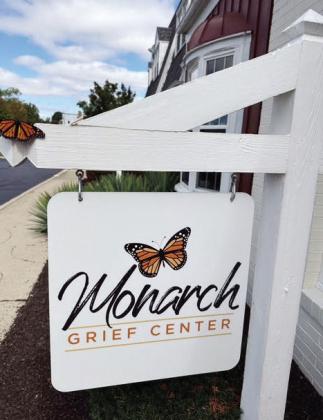A DEFINITION OF GRIEF is “the anguish experienced after significant loss, usually the death of a beloved person.” It is that, and more.
“Grief is universal in the sense that everyone can relate to it,” Amy Rowe said. “It is unique, though, because everyone’s experience is their own. It’s not to be lumped together with everybody else’s experience.”
Rowe is co-founder, outreach director, and grief counselor at Monarch Grief Center, a nonprofit counseling center in Perrysburg that in February marked its one-year anniversary. She and fellow co-founder Tim Polakowski, who is the center’s executive director and a grief counselor, built on their experiences as social workers at a local hospice to develop Monarch, bringing a new emphasis on how to help those who grieve.
“This is an integrated process,” Polakowski said. “It’s not healing, because that sounds like there’ll be an end. Grief bubbles up decades later, not as intensely. The idea is to integrate your grief with your new life.”
He added that grief counseling is not about mental health, because unlike those who suffer from mental health disorders, “there’s nothing wrong with you when you’re grieving. Grieving is a normal human experience.”
He and Rowe noted the generally recognized five stages of grieving, as set forward more than 50 years ago by Swiss-American psychiatrist Elisabeth Kubler-Ross in her 1969 book, On Death and Dying: denial, anger, bargaining, depression, and acceptance.
“Not everyone feels those in that order,” Rowe said. “Some people go through all five in five minutes. Going through the stages implies that there’s a linear approach to grief. That’s not how it works.”
Rowe explained Monarch’s approach. “We counsel people, allow people to feel what they feel and express what they express. If it doesn’t fit into those five stages, it doesn’t mean they’re doing it wrong.
“We think people who are grieving don’t have to go through certain stages in a certain order or at all. People have the right to feel what they feel. We feel strongly about validating those feelings and providing a space where they can express themselves.”
Rowe added, “We’re not saying those five stages are bad. They’re not. They’re not really what the best practice is now.”
She said in the not-too-distant past, people who were grieving were often simply told to dismiss their grief. “But that’s not the way we’re made,” Rowe said. “We’re made for relationships, and when those relationships end, that’s a challenge. We don’t subscribe to ‘just get over it.’ We say, ‘Let’s talk about it and let’s find out a way to get through it.’” She said Monarch sees clients individually and in groups. “We’re in the process of building our practice through building bridges with other agencies. We feel there is a lot of work to be done in grief and bereavement.”
Rowe said a hallmark of Monarch is its varied number of special grief counseling groups. “For the most part grief groups are general—you might have an 80-year-old man who just lost his wife of 60 years in the same group with a 30-year-old woman whose baby was stillborn.
“We have a number of specialized support groups based on the nature of death or the age of the person or the stage of life—a middle-age spousal loss group, an older adult spousal loss group, a loss of a sibling or parent group, loss to addiction or overdose.”
She said Monarch is in the process of establishing more groups, for those who lost a loved one to suicide, lost a young child, or have had miscarriages.
Many other grief support groups are peer-led, but Rowe said Monarch’s groups are led by licensed professionals.
Rowe and Polakowski said Monarch accepts Medicare, Medicaid, and other forms of major insurance. “One of our founding principles,” she said, “is that we don’t want finances to be a burden.” She said Monarch has a fund supported by their development efforts to provide clients with fiscal aid as needed.
Such development comes through their being visible in the community. “We go to senior centers, churches, and groups to let people know who we are and what we do. We want to improve grief literacy in the community,” she said.
“No one wants to admit they need help—it’s kind of a taboo subject,” Rowe said about seeking grief counseling. “We try to demystify it. There are people who don’t need it; they can get by in their own time and move on. For the ones who find themselves stuck or really struggling, we’re available to them.
“We see the need is great,” Rowe said. “We plan on expanding our services.”
Rowe said Monarch wants people to feel less alone in their grief journey. “We stand beside them,” she said, “and help them navigate and move through their grief.”
Monarch Grief Center is located at 314 Louisiana Ave., Perrysburg, and can be reached at 567-331-8601 and at monarchgriefcenter.org.
Dennis Bova is a freelance writer and editor. ✲



